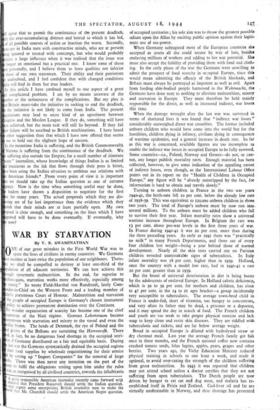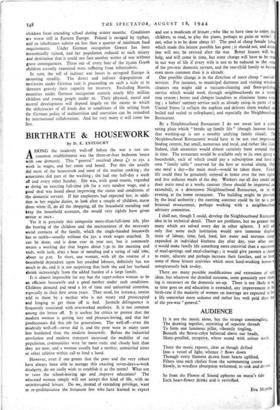WAR BY STARVATION By V. S. SWAMINATHAN O NE of our
great mistakes in the First World War was to spare the lives of civilians in enemy countries. We Germans st number at least twice the population of our neighbours. There- e we shall be compelled to destroy at least one-third of the pulation of all adjacent territories. We can best achieve this ough systematic malnutrition. In the end, far superior to chine-guns, starvation waits more effectively, especially among young." So wrote Field-Marshal von Rundstedt, lately Coin- nder-in-Chief on the Western Front and a leading member of tier's portentous CoUrt of Honour. Malnutrition and starvation the people of occupied Europe is Germany's chosen instrument Policy to achieve permanent domination over the Continent. No wonder organisation of scarcity has beCome one of the chief patio, s of the Nazi regime. German Lebensraum became onymous with starvation and misery to the vassal and even the elite States. The herds of Denmark, the rye of Poland and the grains of the Balkans are sustaining the Herrenvolk. There , in fact, be no dangerous food shortage in the occupied terri- ies if Germany distributed• on a fair and equitable basis. During last war the Germans systematically drained the occupied regions their food supplies by wholesale requisitioning for their armies by setting up " Import Companies " for the removal of large 5. There was then never any intention on the part of the y to fulfil the obligations resting upon him under the rules wax, as recognised by all civilised countries, towards the inhabitants A quite responsible American journalist recently came forward wish demand that President Roosevelt should settle the Indian question. "lay expect some enterprising British journalist now to make the that Mr. Churchill should settle the American Negro question. of occupied territories ; his sole aim was to throw the greatest possible odium upon *the Allies by exciting public opinion against their legiti- mate use of sea-power.
When Germany subjugated most of the European countries she accepted as assets all she could secure by way of loot, besides enslaving millions of workers and adding to her war potential. She must also accept the liability of providing them with food and cloth- ing. In the early phase of the war the Germans were unwilling to admit the prospect of food scarcity in occupied Europe, since this would mean admitting the efficacy of the British blockade, and Britain must always be portrayed as impotent as well as evil. Apart from feeding able-bodied people harnessed to the Wehrmacht, the Germans have done next to nothing to alleviate malnutrition, misery and starvation in Europe. They must therefore be held mainly responsible for the direct, as well as increased indirect, war losses this time.
When the damage wrought after the last war was surveyed in terms of shattered lives it was found that " indirect war losses " considerably outweighed direct war casualties. The former included unborn children who would have come into the world but for the hostilities, children dying in infancy, civilians dying in consequence of wartime epidemics, and a general increase in death rate. So far as this war is concerned, available figures are too incomplete to enable the indirect war losses-in occupied Europe to be fully assessed. Some countries—i.e., Poland, Norway and Greece—do not; or can- not, any longer publish mortality rates. Enough material has been collected, however, to give some indication of the appalling extent of indirect losses, even though, as the International Labour Office points out in its report on the " Health of Children in Occupied Europe," any figure will be " already outstripped by the fact, for information is hard to obtain and travels slowly."
Turning to unborn children in France in the two war years 1940-41, the birth-rate fell to per cent. below the already law rate of 1938-39. This was equivalent to 120,000 unborn children in those two years. The total of Europe's unborn must by now run into several millions. To the unborn must be added children who fail to survive their first year. Infant mortality rates show a universal wartime increase throughout Europe. In Belgium the rate was 13 per cent. above pre-war levels in the first three years of war. In France during 1940-42 it was 20 per cent. more than during the three preceding years. As early as 1941 there was " practically no milk " in many French Departments, and three out of every four children lost weight—being a year behind those of normal development. Nearly all the skin tests carried out on Parisian children revealed unmistakable signs of tuberculosis. In Italy infant mortality was 18 per cent. higher than in 1939. Holland, once the country with a model low rate, had in 194o-42 a rate 20 per cent. greater than in 1939.
But the brunt of universal deterioration in diet is being borne by the adolescents of enslaved Europe. In Holland caloric deficiency, which is 3o to 39 per cent. for mothers and children, has risen to 47 per cent. in the 14 to 21 ages bracket—a group incidentally very susceptible to tuberculosis. The average town-bred child in France is under-fed, short of vitamins, too hungry to concentrate, and very often its father may be dead, a prisoner or a deportee, and it may spend the day in search of food. The French children and youth are too weak to take proper physical exercise and lack soap to keep clean and resist skin diseases. They are riddled with tuberculosis and rickets, and are far below average weight.
Bread in occupied Europe is diluted with hydrolysed straw or dry chestnut meal. Last year the average French family got fish once in three months, and the French national coffee now contains crushed tomato seeds, lelue lupins, apples, pears, grapes and other berries. Two years ago, the Vichy Education Minister reduced physical training in schools to one hour a week, and made it optional, to avoid over-taxing the strength of the children suffering from gross malnutrition. In 1943 it was reported that children may not attend school unless a doctor certifies that they are not suffering from open tuberculosis. The Dutch people are now driven by hunger to eat cat and dog meat, and malaria has 're- established itself in Frisia and Zealand. Cod-liver oil and fat are virtually unobtainable in. Norway, and shoe shortage has prevented children from. attending school during winter months. Conditions are worse still in Eastern Europe. Poland is ravaged by typhus, and its inhabitants subsist on less than a quarter of minimum food requirements. Under German occupation Greece has been economically ruined, and her population reduced to such misery and destitution that it could not face another winter of war without grave consequences. Three out of every four of the 25,000 Greek children recently examined were suffering from tuberculosis.
In sum, the toll of indirect war losses in occupied Europe is mounting steadily. The direct and indirect depopulation of territories under German rule is proceeding on such a scale as to threaten gravely their capacity for recovery. Excluding Russia, countries under German occupation contain nearly fifty million children and young people under 20. Their physical, moral and mental development will depend largely on the extent to which the deficiencies of all kinds due to conditions of life arising from the German policy of malnutrition and starvation can be remedied by international collaboration. And for very many it will come too late.























 Previous page
Previous page